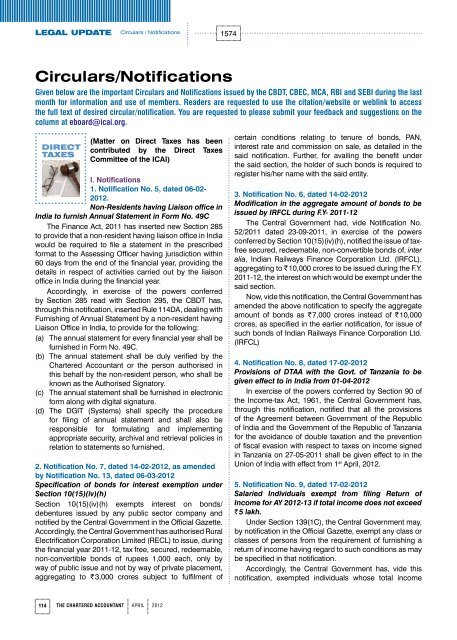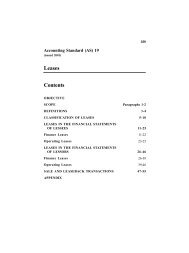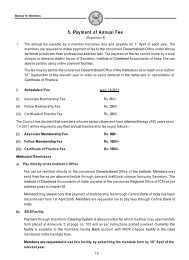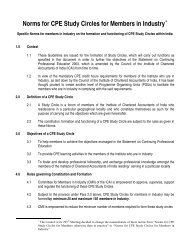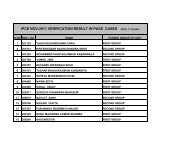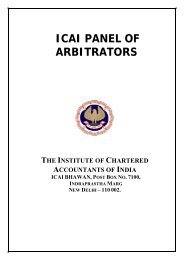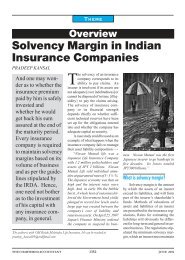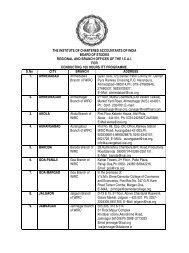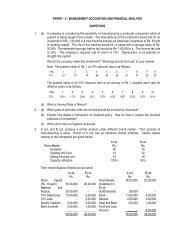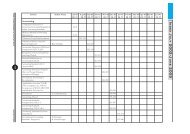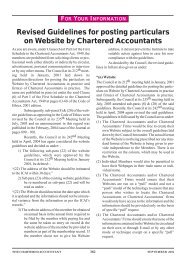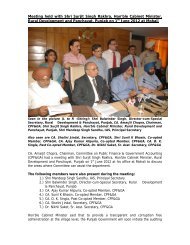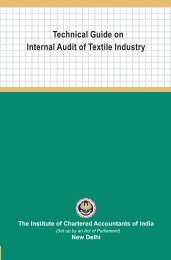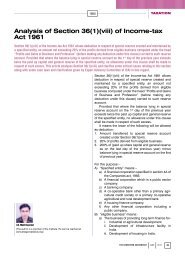Circulars/Notifications
Circulars/Notifications
Circulars/Notifications
You also want an ePaper? Increase the reach of your titles
YUMPU automatically turns print PDFs into web optimized ePapers that Google loves.
LEGAL UPDATE <strong>Circulars</strong> / <strong>Notifications</strong><br />
<strong>Circulars</strong>/<strong>Notifications</strong><br />
Given below are the important <strong>Circulars</strong> and <strong>Notifications</strong> issued by the CBDT, CBEC, MCA, RBI and SEBI during the last<br />
month for information and use of members. Readers are requested to use the citation/website or weblink to access<br />
the full text of desired circular/notification. You are requested to please submit your feedback and suggestions on the<br />
column at eboard@icai.org.<br />
DIRECT<br />
TAXES<br />
114<br />
(Matter on Direct Taxes has been<br />
contributed by the Direct Taxes<br />
Committee of the ICAI)<br />
I. <strong>Notifications</strong><br />
1. Notification No. 5, dated 06-02-<br />
2012.<br />
Non-Residents having Liaison office in<br />
India to furnish Annual Statement in Form No. 49C<br />
The Finance Act, 2011 has inserted new Section 285<br />
to provide that a non-resident having liaison office in India<br />
would be required to file a statement in the prescribed<br />
format to the Assessing Officer having jurisdiction within<br />
60 days from the end of the financial year, providing the<br />
details in respect of activities carried out by the liaison<br />
office in India during the financial year.<br />
Accordingly, in exercise of the powers conferred<br />
by Section 285 read with Section 295, the CBDT has,<br />
through this notification, inserted Rule 114DA, dealing with<br />
Furnishing of Annual Statement by a non-resident having<br />
Liaison Office in India, to provide for the following:<br />
(a) The annual statement for every financial year shall be<br />
furnished in Form No. 49C.<br />
(b) The annual statement shall be duly verified by the<br />
Chartered Accountant or the person authorised in<br />
this behalf by the non-resident person, who shall be<br />
known as the Authorised Signatory.<br />
(c) The annual statement shall be furnished in electronic<br />
form along with digital signature.<br />
(d) The DGIT (Systems) shall specify the procedure<br />
for filing of annual statement and shall also be<br />
responsible for formulating and implementing<br />
appropriate security, archival and retrieval policies in<br />
relation to statements so furnished.<br />
2. Notification No. 7, dated 14-02-2012, as amended<br />
by Notification No. 13, dated 06-03-2012<br />
Specification of bonds for interest exemption under<br />
Section 10(15)(iv)(h)<br />
Section 10(15)(iv)(h) exempts interest on bonds/<br />
debentures issued by any public sector company and<br />
notified by the Central Government in the Official Gazette.<br />
Accordingly, the Central Government has authorised Rural<br />
Electrification Corporation Limited (RECL) to issue, during<br />
the financial year 2011-12, tax free, secured, redeemable,<br />
non-convertible bonds of rupees 1,000 each, only by<br />
way of public issue and not by way of private placement,<br />
aggregating to R3,000 crores subject to fulfilment of<br />
THE CHARTERED ACCOUNTANT april 2012<br />
1574<br />
certain conditions relating to tenure of bonds, PAN,<br />
interest rate and commission on sale, as detailed in the<br />
said notification. Further, for availing the benefit under<br />
the said section, the holder of such bonds is required to<br />
register his/her name with the said entity.<br />
3. Notification No. 6, dated 14-02-2012<br />
Modification in the aggregate amount of bonds to be<br />
issued by IRFCL during F.Y- 2011-12<br />
The Central Government had, vide Notification No.<br />
52/2011 dated 23-09-2011, in exercise of the powers<br />
conferred by Section 10(15)(iv)(h), notified the issue of taxfree<br />
secured, redeemable, non-convertible bonds of, inter<br />
alia, Indian Railways Finance Corporation Ltd. (IRFCL),<br />
aggregating to R10,000 crores to be issued during the F.Y.<br />
2011-12, the interest on which would be exempt under the<br />
said section.<br />
Now, vide this notification, the Central Government has<br />
amended the above notification to specify the aggregate<br />
amount of bonds as R7,000 crores instead of R10,000<br />
crores, as specified in the earlier notification, for issue of<br />
such bonds of Indian Railways Finance Corporation Ltd.<br />
(IRFCL)<br />
4. Notification No. 8, dated 17-02-2012<br />
Provisions of DTAA with the Govt. of Tanzania to be<br />
given effect to in India from 01-04-2012<br />
In exercise of the powers conferred by Section 90 of<br />
the Income-tax Act, 1961, the Central Government has,<br />
through this notification, notified that all the provisions<br />
of the Agreement between Government of the Republic<br />
of India and the Government of the Republic of Tanzania<br />
for the avoidance of double taxation and the prevention<br />
of fiscal evasion with respect to taxes on income signed<br />
in Tanzania on 27-05-2011 shall be given effect to in the<br />
Union of India with effect from 1 st April, 2012.<br />
5. Notification No. 9, dated 17-02-2012<br />
Salaried Individuals exempt from filing Return of<br />
Income for AY 2012-13 if total income does not exceed<br />
R5 lakh.<br />
Under Section 139(1C), the Central Government may,<br />
by notification in the Official Gazette, exempt any class or<br />
classes of persons from the requirement of furnishing a<br />
return of income having regard to such conditions as may<br />
be specified in that notification.<br />
Accordingly, the Central Government has, vide this<br />
notification, exempted individuals whose total income
does not exceed R5 lakh from the requirement of<br />
furnishing a return of income under Section 139(1) for<br />
A.Y. 2012-13, if his total income consists of only income<br />
chargeable to income-tax under the head “Salaries” and<br />
interest, not exceeding R10,000, from savings account in<br />
a bank chargeable under the head “Income from other<br />
sources”.<br />
The other conditions to be satisfied by such individual<br />
to avail the benefit of this exemption are that he should<br />
have –<br />
(1) reported his PAN to his employer;<br />
(2) reported his interest income from savings bank<br />
account to his employer and his employer should<br />
have deducted tax thereon;<br />
(3) received Form 16 from his employer, wherein his<br />
PAN and details of income and tax deducted at<br />
source and deposited to the credit of the Central<br />
Government should be mentioned;<br />
(4) discharged his total tax liability for the assessment<br />
year through TDS and its deposit by the employer<br />
to the Central Government;<br />
(5) no claim for refund of taxes due to him for the<br />
income of the assessment year; and<br />
(6) received salary from only one employer for the<br />
assessment year.<br />
Further, the exemption from the requirement<br />
of furnishing a return of income-tax shall not be<br />
available where a notice under Section 142(1) or Section<br />
148 or Section 153A or Section 153C has been issued for<br />
filing a return of income for the relevant assessment year.<br />
The complete details of the text of the notifications<br />
can be downloaded from the link: http://law.<br />
incometaxindia.gov.in/DIT/<strong>Notifications</strong>.aspx<br />
II. Relevant announcements relating to Central<br />
Processing Centre (CPC)<br />
1. "Set up of New E-filing call centre by CPC<br />
CPC Bangalore has been set up for faster processing of<br />
all e-filed returns of the country. E-filing facility for income<br />
tax payers are currently being provided from New Delhi.<br />
These facilities will soon be made available from CPC<br />
Bangalore premises. A limited five member call center is<br />
being setup at CPC Bangalore premises. This new e-filing<br />
call center has started working from 15 th March 2012. For<br />
any query related to online filing of Income Tax Returns,<br />
please call 080-25186960 between 9 am to 6 pm on all<br />
working days. Taxpayers are advised to make use of the<br />
above facility to clarify their doubts on E filing."<br />
2. Due date for submission of ITR-V<br />
The due date for submission of ITR-V for A.Y. 2011-12 has<br />
been extended upto 31-03-2012 or 120 days from the date<br />
of upload, whichever is later (with no further extension<br />
likely).<br />
1575<br />
INDIRECT<br />
TAXES<br />
<strong>Circulars</strong> / <strong>Notifications</strong><br />
LEGAL UPDATE<br />
(Matter on Indirect Taxes has been<br />
contributed by the Indirect Taxes<br />
Committee of the ICAI)<br />
A. SERVICE TAX<br />
1. No service tax on toll fee paid by<br />
users: Circular No. 152/3/2012-ST<br />
dated 22.02.2012 has been issued to<br />
clarifies that Service tax is not leviable on toll paid by<br />
the users of roads, including those roads constructed<br />
by a Special Purpose Vehicle (SPV) created under an<br />
agreement between National Highway Authority of India<br />
(NHAI) or a State Authority and the concessionaire (Public<br />
Private Partnership Model, Build-Own/Operate-Transfer<br />
arrangement). Tolls collected under the PPP model by the<br />
SPV is collection on own account and not on behalf of the<br />
person who has made the land available for construction<br />
of the road.<br />
However, if the SPV engages an independent entity<br />
to collect toll from users on its behalf and a part of toll<br />
collection is retained by that independent entity as<br />
commission or is compensated in any other manner,<br />
service tax liability arises on such commission or charges,<br />
under the Business Auxiliary Service.<br />
B. CENTRAL EXCISE<br />
1. Rebate of duty paid would be allowed even for<br />
export of goods to Nepal: CBEC has issued Notification<br />
No. 02/2012-Central Excise (N.T.) dated 22-02-2012 to<br />
delete the word “Nepal” from the opening paragraph of<br />
Notification No. 21/2004-Central Excise (N.T.) dated<br />
06-09-2004 which allow rebate of the duty paid on<br />
excisable goods used in the manufacture or processing of<br />
goods exported out of India except to Nepal and Bhutan.<br />
Hence, now even export to Nepal would be treated as<br />
an export to any country and rebate of the duty paid on<br />
excisable goods used in the manufacture or processing<br />
of goods would be allowed for export of goods to Nepal.<br />
2. Stringent Restrictions on manufacturer, first stage<br />
dealer, second stage dealer and an exporter: CBEC<br />
has issued Notification Nos. 03-05/2012-Central Excise<br />
(N.T.) dated 12-03-2012 which provide very stringent<br />
restrictions on manufacturer, first stage dealer, second<br />
stage dealer and an exporter prima facie found knowingly<br />
involved in any of the seven activities mentioned in the<br />
Notification No. 05/2012-Central Excise (N.T.) dated<br />
12-03-2012 if the duty of excise or CENVAT Credit alleged<br />
to be involved exceeds Rs10 lakh. The restrictions which<br />
may be imposed are like payment of duty on each removal<br />
of goods, restriction on utilization of CENVAT Credit, etc.<br />
3. Change in ownership or shifting of Unit to a new<br />
location within the specified area does not affect<br />
the exemption under area – based <strong>Notifications</strong> No.<br />
THE CHARTERED ACCOUNTANT april 2012 115
LEGAL UPDATE <strong>Circulars</strong> / <strong>Notifications</strong><br />
49/2003-CE and 50/2003-CE, both dated 10.06.2003:<br />
CBEC has issued Circular No. 960/03/2012-CX dated<br />
17.02.2012 which clarify that exemption under area –<br />
based <strong>Notifications</strong> No. 49/2003-CE and 50/2003-CE, both<br />
dated 10-06-2003 would continue to be available even in<br />
the following cases:<br />
(i) when there is change in the ownership of a Unit<br />
already availing of the benefit of an area-based<br />
exemption Notification.<br />
(ii) when a Unit availing the exemption physically shift<br />
to a new location within the areas specified in the<br />
exemption Notification.<br />
(iii) when a Unit availing of the exemption under an areabased<br />
Notification expands by acquiring a plot of<br />
land adjacent to its existing premises and installing<br />
new plant/machinery on such land.<br />
The complete text of the above-mentioned notifications<br />
and circulars can be downloaded from the following<br />
link: www.cbec.gov.in<br />
116<br />
FEMA<br />
(Matter on FEMA has been<br />
contributed by CA. Manoj Shah and<br />
CA. Hinesh Doshi)<br />
1. Clarification on reporting<br />
requirement for Purchase of<br />
Immovable Property in India<br />
A.P. (DIR Series) Circular No. 79<br />
dated 15 th February, 2012<br />
Presently, a person resident outside India, who<br />
has established in India, a branch, office or other place<br />
of business, excluding a liaison office, acquires any<br />
immovable property in India is required to file with the RBI<br />
a declaration in the prescribed form IPI not later than 90<br />
days from the date of such acquisition.<br />
The extant regulations do not prescribe any reporting<br />
requirements for transactions where a person resident<br />
outside India who is a citizen of India or a Person of Indian<br />
Origin as defined in Regulation 2(c) of Notification No.<br />
FEMA 21/2000-RB, ibid, acquire/s immovable property in<br />
India. Accordingly, Form IPI has now been amended for<br />
greater clarity.<br />
2. Export of Goods and Services - Simplification and<br />
Revision of Softex Procedure<br />
A.P. (DIR Series) Circular No. 80 dated 15 th February, 2012<br />
Presently, the Designated officials of the Ministry<br />
of Information Technology, Government of India at the<br />
Software Technology Parks of India (STPIs) or at Free<br />
Trade Zones (FTZs) or Export Processing Zones (EPZs)<br />
or Special Economic Zones (SEZs), had been authorised<br />
to certify exports declared through SOFTEX Forms. This<br />
procedure is revisited and revised as given below, in<br />
consultation with the stakeholders involved.<br />
THE CHARTERED ACCOUNTANT april 2012<br />
1576<br />
As per the revised procedure, a software exporter,<br />
whose annual turnover is at least R1,000 crore or who<br />
files at least 600 SOFTEX forms annually, will be eligible to<br />
submit a statement in excel format as per the prescribed<br />
format giving all particulars along with quadruplicate set<br />
of SOFTEX form to the nearest STPI. STPI will then verify<br />
the details and decide on a percentage sample check of<br />
the documents in details. Software companies will submit<br />
all the documents on demand to STPI within 30 days<br />
of their advice or any reasonable/extended time at the<br />
discretion of the Director, STPI, at the request from the<br />
exporter. STPI will thus certify the statement and SOFTEX<br />
forms in bulk on the “Top Sheet” regarding the values,<br />
etc. and will thereafter forward the first copy of the revised<br />
SOFTEX format to the concerned Regional Office of RBI,<br />
the duplicate copy along with bulk statement in excel<br />
format to Authorised Dealers for negotiation/collection/<br />
settlement, the third copy to the exporter and the last<br />
copy will be retained by STPI for its own record. Under<br />
the revised procedure, the exporters, however, will have<br />
to provide information about all the invoices including<br />
the ones lesser than $25,000, in the bulk statement in<br />
excel format. The revised procedure for submission of the<br />
SOFTEX form and other relevant documents are detailed<br />
in the Annex to the circular.<br />
The new procedure will be effective initially in STPI<br />
Bangalore, Hyderabad, Chennai, Pune and Mumbai with<br />
effect from 1 st April, 2012. Based on the success in these<br />
centers, it would be adopted by all the STPIs and SEZ/<br />
EPZ/100% EOU/EHTP/DTA units by June 2012.<br />
The above circular is available on RBI website at:<br />
http://www.rbi.org.in/Scripts/NotificationUser.<br />
aspx?Id=7009&Mode=0<br />
3. Receipt of advance payment for export of goods<br />
involving shipment (manufacture and ship) beyond<br />
one year<br />
A.P. (DIR Series) Circular No.81 dated 21 st February, 2012<br />
RBI has permitted AD Category- I banks to allow<br />
exporters to receive advance payment for export of goods<br />
which would take more than one year to manufacture<br />
and ship and where the ‘export agreement’ provides for<br />
shipment of goods extending beyond the period of one<br />
year from the date of receipt of advance payment subject<br />
to the specified conditions.<br />
For condition, please refer circular available on RBI<br />
website at: http://www.rbi.org.in/Scripts/NotificationUser.<br />
aspx?Id=7012&Mode=0<br />
4. Liberalisation in release of Foreign Exchange for<br />
Imports<br />
A.P. (DIR Series) Circular No. 82 dated 21 st February,<br />
2012<br />
Presently, applications by persons, firms and<br />
companies for making payments, exceeding $500 or its
equivalent towards imports into India must be made in<br />
Form A-1. The said limit has been reviewed and it has<br />
been decided as a measure of liberalisation to raise the<br />
above limit for foreign exchange remittance towards<br />
imports without any documentation formalities, from<br />
$500 or its equivalent to $5,000 or its equivalent, with<br />
immediate effect. It is clarified that the ADs need not<br />
obtain any document, including Form A1, except a simple<br />
letter from the applicant containing the basic information<br />
viz., the name and the address of the applicant, name and<br />
address of the beneficiary, amount to be remitted and the<br />
purpose of remittance, as long as the exchange being<br />
purchased is for a current account transaction (and is not<br />
included in the Schedules I and II of the Foreign Exchange<br />
Management (Current Account Transactions) Rules,<br />
2000 framed by Government of India vide Notification<br />
No. G.S.R.381 (E) dated 3 rd May, 2000, as amended<br />
from time to time, the amount does not exceed<br />
$5,000 or its equivalent and the payment is made by a<br />
cheque drawn on the applicant's bank account or by a<br />
Demand Draft.<br />
5. Import of Gold on loan basis - Tenor of loan and<br />
opening of stand-by Letter of Credit (SBLC)<br />
A.P. (DIR Series) Circular No. 83 dated 27 th February, 2012<br />
Presently, the maximum tenor of gold loan is 240<br />
days consisting of 60 days for manufacture and exports<br />
plus 180 days for fixing the price and repayment of gold<br />
loan as per the Foreign Trade Policy 2004-2009 of the<br />
GOI and that the tenor of the SBLC, for import of gold on<br />
loan basis, where ever required, should be in line with the<br />
aforesaid tenor of gold loan.<br />
As per Para 4A 23.2 and Para 4A 23.3 of the Hand<br />
Book of Procedures (HBP) Vol. I of the Foreign Trade<br />
Policy (FTP) 2009-14, the export has to be completed<br />
within a maximum period of 90 days from the date<br />
of release of gold on loan basis and the exporter<br />
shall have flexibility to fix the price and repay gold<br />
loan within 180 days from date of export. Accordingly,<br />
the maximum tenor of gold loan becomes 270 days at<br />
present (i.e. 90 days for manufacture and export plus<br />
180 days for fixing the price and repayment) as per FTP<br />
2009-14.<br />
Accordingly, AD Banks are advised to comply that the<br />
maximum period of gold loan shall be as per the Foreign<br />
Trade Policy 2009-14 or as notified by the GOI from time<br />
to time, in this regard and the tenor of SBLC, for import of<br />
gold on loan basis, where ever required, should also be in<br />
line with the tenor of gold loan.<br />
6. Compilation of R-Returns - Reporting under<br />
Foreign Exchange Transactions – Electronic<br />
Reporting System (FETERS)<br />
A.P. (DIR Series) Circular No. 84 dated 29 th February,<br />
2012<br />
1577<br />
<strong>Circulars</strong> / <strong>Notifications</strong><br />
LEGAL UPDATE<br />
RBI had vide A.P. (DIR Series) Circular No.77 dated<br />
13 th March, 2004, issued guidelines for compilation<br />
of R-Returns and reporting under FETERS. In view of<br />
the subsequent developments necessitating further<br />
modifications in FETERS, the following changes<br />
are made in reporting of R-Returns from the next<br />
financialyear (i.e., transactions taking place from<br />
1 st April, 2012):<br />
(i) The purpose codes for classification and reporting of<br />
foreign exchange transactions in FETERS should be<br />
as per the revised classification with effect from first<br />
fortnight of April 2012 as per the guidelines provided<br />
in the circular.<br />
(ii) AD banks may indicate purpose codes for all<br />
foreign exchange transactions (including receipts<br />
under non-export transactions below R5 lakhs)<br />
under FETERS. The present system of reporting<br />
of non-export transactions below R5 lakhs (a)<br />
on a consolidated basis in BoP file and (b)<br />
submission of purpose-wise distribution of a<br />
sample of such small receipt transactions (as part<br />
of R-return in the URS file under FETERS), will<br />
be discontinued for transactions beyond<br />
31 st March, 2012.<br />
(iii) The amount field in all FETERS files will be increased<br />
to 15-digit format.<br />
(iv) 6-digit port code will be used uniformly for reporting<br />
under FETERS.<br />
For the detailed revised Guidelines for Submission of<br />
Data under the FETERS, please refer the above circular<br />
available at: http://www.rbi.org.in/Scripts/NotificationUser.<br />
aspx?Id=7026&Mode=0<br />
7. External Commercial Borrowings (ECB) for<br />
Infrastructure facilities within National Manufacturing<br />
Investment Zone (NMIZ)<br />
A.P. (DIR Series) Circular No. 85 dated 29 th February, 2012<br />
As per the extant guidelines, the infrastructure sector for<br />
the purpose of availing ECB is defined to include (i) power,<br />
(ii) telecommunication, (iii) railways, (iv) road including<br />
bridges, (v) sea port and airport, (vi) industrial parks, (vii)<br />
urban infrastructure (water supply, sanitation and sewage<br />
projects), (viii) mining, refining and exploration and (ix)<br />
cold storage or cold room facility, including for farm level<br />
pre-cooling, for preservation or storage of agricultural and<br />
allied produce, marine products and meat. Developers<br />
of SEZ were also allowed to provide such infrastructure<br />
facilities within the SEZ.<br />
Keeping in view the infrastructural needs of the<br />
proposed NMIZs, it has now been decided to allow<br />
developers of NMIZ also to avail of ECB under the<br />
"approval route" for providing infrastructure facilities<br />
within the NMIZ, as indicated above. Press release<br />
for the same was issued dated 29 th February, 2012.<br />
THE CHARTERED ACCOUNTANT april 2012 117
LEGAL UPDATE <strong>Circulars</strong> / <strong>Notifications</strong><br />
8. Clarification on delegation of power - in<br />
Establishment of Branch Offices (BO)/Liaison Offices<br />
(LO) in India by Foreign Entities<br />
A.P. (DIR Series) Circular No. 88 dated 1 st March, 2012<br />
It has been clarified that transfer of assets of LO/<br />
BO to subsidiaries or other LO/BO or any other entity is<br />
permitted only with the specific approval of the Central<br />
Office of the Foreign Exchange Department, RBI.<br />
9. Foreign Institutional Investor (FII) investment in ‘to<br />
be listed’ debt securities<br />
A.P. (DIR Series) Circular No. 89 dated 1 st March, 2012.<br />
Presently, as per the Foreign Exchange Management<br />
(Transfer or Issue of Security by a Person Resident Outside<br />
India) Regulations, 2000 as amended, the Securities<br />
and Exchange Board of India (SEBI) registered FIIs are<br />
allowed to invest only in listed non-convertible debentures<br />
(NCDs)/bonds issued by an Indian company.<br />
SEBI has, vide their circular CIR/IMD/FIIC/18/2010<br />
dated 26 th November, 2010, issued instructions on<br />
the revised allocation of investment limits to FIIs.<br />
In terms of paragraph 8 of the circular, SEBI has<br />
allowed FIIs to invest in ‘to be listed’ debt securities.<br />
Accordingly, it has been decided that SEBI registered FIIs/<br />
sub-accounts of FIIs can now invest in primary issues of<br />
Non-Convertible Debentures (NCDs)/bonds only if listing<br />
of such bonds/NCDs is committed to be done within<br />
15 days of such investment. In case the NCDs/bonds<br />
issued to the SEBI registered FIIs/sub-accounts of FIIs<br />
are not listed within 15 days of issuance to the SEBI<br />
registered FIIs/sub-accounts of FIIs, for any reason, then<br />
the FII/sub-account of FII shall immediately dispose of<br />
these bonds/NCDs either by way of sale to a third party<br />
or to the issuer and the terms of offer to FIIs/sub-accounts<br />
should contain a clause that the issuer of such debt<br />
securities shall immediately redeem/buyback the said<br />
securities from the FIIs/sub-accounts of FIIs in such an<br />
eventuality.<br />
10. Clarification on Liberalised Remittance Scheme<br />
(LRS) for Resident Individuals<br />
A.P. (DIR Series) Circular No. 90 dated 6 th March, 2012.<br />
RBI has clarified that -<br />
(i) the LRS facility is available to all resident individuals<br />
including minors. In case of remitter being a minor,<br />
the LRS declaration form must be countersigned by<br />
the minor’s natural guardian.<br />
(ii) Remittances under the facility can be consolidated in<br />
respect of family members subject to individual family<br />
members complying with the terms and conditions of<br />
the scheme; and<br />
(iii) Remittances under the scheme can be used for<br />
purchasing objects of art subject to the provisions<br />
of other applicable laws such as the extant Foreign<br />
Trade Policy of the Government of India.<br />
118<br />
THE CHARTERED ACCOUNTANT april 2012<br />
1578<br />
For the modified LRS application cum declaration form,<br />
please refer above circular available on RBI website:<br />
http://www.rbi.org.in/Scripts/NotificationUser.<br />
aspx?Id=7047&Mode=0<br />
11. Reporting Platform for OTC Foreign Exchange<br />
and Interest Rate Derivatives<br />
FMD.MSRG.No.67/02.05.002/2011-12 dated 9 th March,<br />
2012<br />
As per the recommendation of a Working Group<br />
constituted in June 2010 to work out the modalities for<br />
an efficient, single point reporting mechanism for all OTC<br />
interest rate and forex derivative transactions, RBI has<br />
decided that:<br />
(i) All inter-bank OTC inter-bank foreign exchange<br />
derivatives shall be reported on a platform to be<br />
developed by the Clearing Corporation of India<br />
Limited (CCIL).<br />
(ii) All/selective trades in OTC foreign exchange and<br />
interest rate derivatives between the Category–I<br />
Authorised Dealer Banks/market makers (banks/<br />
PDs) and their clients shall be reported on the<br />
CCIL platform subject to a mutually agreed upon<br />
confidentiality protocol.<br />
CCIL has been advised to undertake development<br />
of reporting platform for the purpose mentioned above.<br />
Besides, the market representative bodies, viz. Foreign<br />
Exchange Dealers Association of India (FEDAI), Fixed<br />
Income, Money Market and Derivatives Association of<br />
India (FIMMDA) and Primary Dealers Association of<br />
India (PDAI) have been advised to assist the CCIL in<br />
development of the confidentiality protocol. The CCIL<br />
will, in due course, keep the banks/PDs informed of the<br />
technology upgradation required for the purpose along<br />
with the time lines for completion of various milestones.<br />
CORPORATE<br />
LAWS<br />
(Matter on Corporate Laws has been<br />
contributed by CA. Jayesh Thakur,<br />
Mumbai)<br />
MCA (www.mca.gov.in)<br />
1. Registration of companies or<br />
LLPs by professionals<br />
The MCA has issued General<br />
Circular No. 02/2012 dtd. 01-03-<br />
2012 clarifying that where at the time of incorporation of<br />
companies, one of the objects is to carry on the business<br />
of banking, insurance or to practice the profession of<br />
chartered accountancy, cost accountancy and company<br />
secretaries, then the concerned Registrar of Companies<br />
shall incorporate the same only on production of inprinciple<br />
approval/NOC from the concerned regulator/<br />
professional institutes. It is also clarified that where one<br />
of the objects is to carry on the business/profession of
architecture, then the concerned Registrar of Companies/<br />
Registrar of LLP shall incorporate the same only on<br />
production of the in-principle approval/NOC from the<br />
concerned regulator. One may refer to the above citation<br />
for further details.<br />
2. Timeline extended for DIN holders to submit PAN<br />
The MCA has issued General Circular No. 04/2012<br />
dtd. 09-03-2012 extending the timeline for filing form DIN-4<br />
by DIN holders for furnishing PAN and to update PAN<br />
details upto 30-04-2012. One may refer to the above<br />
citation for further details.<br />
3. Committee constitution to formulate a policy<br />
document on corporate governance<br />
The MCA has issued General Circular No. 03/2012<br />
dtd. 07-03-2012 stating that while the issue of how<br />
corporates decide to carry on their affairs is largely a<br />
matter of their choice subject to conformity with the law,<br />
the increasing importance of businesses to the economies<br />
and complexities of operating in an inter-dependent world<br />
have brought home the need for business chambers,<br />
professions, regulators and even the governments to take<br />
interest in this aspect. Also, concerns relating to the quality<br />
of corporate governance system and the need to maintain<br />
its integrity and public accountability have resulted in a<br />
number of public interventions all over the world including<br />
the well known Cadbury Code (1992) and the Sarbanes-<br />
Oxley Act (2002) of the UK and US respectively. In India,<br />
too, a few elements of good corporate governance find<br />
mention in legal frameworks like the listing agreement<br />
of SEBI and a few of the provisions of the Companies<br />
Bill 2011. More detailed guidelines are also available,<br />
including the Voluntary Code on Corporate Governance<br />
of the CII (1998) and the National Voluntary Guidelines<br />
on Corporate Governance of this Ministry (2009) which<br />
are currently under revision by a Committee under the<br />
Chairmanship of Shri Kiran Karnik. The MCA states that<br />
a need has, however, been felt to also have a formal<br />
policy document that synthesises the disparate elements<br />
in diverse guidelines, draws on innovative best practices<br />
adopted by specific companies, incorporates the current<br />
international trends, and anticipates emerging demands<br />
on corporate governance in enterprises in various classes<br />
and scales of operation. While the policy is expected<br />
to be applicable across the corporate sector, it is not<br />
intended to dilute or whittle down the liberty to self-govern<br />
that is the hallmark of functioning of this sector - it is only<br />
intended to ensure that board and management practices<br />
and other processes conform to more standardised<br />
norms. A concept paper on the subject entitled "Concept<br />
Paper on National Corporate Governance Policy, 2012”<br />
was earlier released and which was meant to facilitate<br />
public discussion and in ascertaining views of all<br />
stakeholders and suggesting a policy document by<br />
the Committee constituted. The paper is also meant to<br />
1579<br />
<strong>Circulars</strong> / <strong>Notifications</strong><br />
LEGAL UPDATE<br />
serve as the basis for the deliberations and the outcome<br />
of the work of the Committee. A Committee under the<br />
Chairmanship of Mr. Adi Godrej is formed for the purpose<br />
and submit its report. One may refer to the above citation<br />
for further details.<br />
4. Role-check for the DSCs belonging to authorised<br />
signatories of Banks/FIs<br />
The MCA has issued Circular No. HQ/104/2007 dtd.<br />
17-02-2012 reiterating that the use of DSCs has been<br />
mandated for all filings to ensure the security and integrity<br />
of documents filed with the Registry. To substantiate the<br />
requirements, the MCA has introduced role-check for<br />
the Digital Signature Certificates (DSCs) to ensure that<br />
these are correctly applied by the authorised signatory.<br />
The MCA has already introduced role-check of DSCs for<br />
directors of companies from the Director Identification<br />
Number (DIN) database and the professionals (company<br />
secretary/chartered accountant/cost accountant) from the<br />
database taken from the respective institutes. Following<br />
the same process, a mechanism has been formulated<br />
(as given in the Annexure to this Circular) to implement<br />
a similar role-check to establish the veracity of authorised<br />
signatories of banks and financial institutions (FIs), which<br />
is important for charge related services. The banks and<br />
FIs advance credit to the companies and create a charge<br />
on the assets so financed. The charges so created are<br />
required to be registered with the ROC in order to be a<br />
secured creditor. The registration/modification/satisfaction<br />
of a charge are filed with the ROC through the prescribed<br />
form which has to bear the digital signatures of the<br />
company represent-ative as well as that of the authorised<br />
signatory from the bank/FI. The role-check in respect<br />
of the authorised signatory from the bank/FI is required<br />
to ensure that the DSC applied is actually the digital<br />
signature of the authorised person. In view of critical<br />
nature in respect of charge related services, all banks and<br />
financial institutions are requested to follow the role-check<br />
process devised and published through this Circular at<br />
an early date in the MCA21 system. One may refer to the<br />
above citation for further details.<br />
SEBI (www.sebi.gov.in)<br />
5. Investor grievance redressal mechanism at stock<br />
exchanges<br />
The SEBI has issued Circular No. CIR/MIRSD/2/2012<br />
dtd. 15-02-2012 regarding the investor service centres<br />
and recalling that presently, stock exchanges having<br />
nationwide terminals, such as National Stock Exchange<br />
of India Ltd.(NSE) and Bombay Stock Exchange Ltd.<br />
(BSE) operating in equity as well as equity derivative<br />
segments are providing investor grievance redressal<br />
mechanism and arbitration facility (arbitration as well<br />
as appellate arbitration) at four regional centres (Delhi,<br />
Mumbai, Kolkata and Chennai). Now, with a view to<br />
increase investor confidence in the securities market and<br />
THE CHARTERED ACCOUNTANT april 2012 119
LEGAL UPDATE <strong>Circulars</strong> / <strong>Notifications</strong><br />
in order to make it more convenient to the investors to file<br />
their grievances and arbitration cases near to their places,<br />
SEBI has initiated steps to set-up this facility by stock<br />
exchanges at more centres after examining the data on<br />
complaints and arbitrations filed by investors from various<br />
regions. In consultation with all the major stock exchanges,<br />
it has been hence decided that initially, (a) NSE and BSE<br />
shall set up Investor grievance redressal mechanism at<br />
Ahmedabad and Hyderabad by 31 st March, 2012 and at<br />
Kanpur and Indore by 30 th September, 2012, (b) NSE and<br />
BSE shall provide arbitration facility (arbitration as well<br />
as appellate arbitration) at all the above mentioned four<br />
new centers by 30 th September, 2012. They shall abide<br />
by all the applicable circulars issued by SEBI in this<br />
regard, and, (c) NSE and BSE shall have adequate<br />
infrastructure and manpower, as considered appropriate,<br />
at these new centres to handle investor grievance<br />
redressal mechanism and arbitration facility effectively.<br />
One may refer to the above citation for further details.<br />
6. Standardised lot size for SME exchange/platform<br />
The SEBI has issued Circular No. CIR/MRD/<br />
DSA/06/2012 dtd. 21-02-2012 referring to the framework<br />
prescribed by it earlier for setting up of a stock exchange/<br />
trading platform by a recognised stock exchange<br />
having nationwide trading terminals for Small and<br />
Medium Enterprises (SMEs). Now, it has been decided<br />
to standardise the lot size for Initial Public Offer (IPO)<br />
proposing to list on SME exchange/platform and for the<br />
secondary market trading on such exchange/platform.<br />
The following may be noted :<br />
• At the IPO stage, the Registrar to Issue in consultation<br />
with merchant banker/s, issuer and the stock<br />
exchange shall ensure to finalise the basis of allotment<br />
in minimum lots and in multiples of minimum lot size,<br />
as per the above given table. The secondary market<br />
trading lot size shall be the same, as shall be the IPO<br />
lot size at the application/allotment stage, facilitating<br />
secondary market trading.<br />
• At the IPO stage if the price band decided, falls<br />
within two different price bands than the minimum<br />
application lot size shall be decided based on the<br />
price band in which the higher price falls into. For<br />
example: if the proposed price band is at 24-28 than<br />
the Lot size shall be 4,000 shares.<br />
• The lot size shall not be reduced by the exchange to<br />
below the initial lot size if the trading price is below<br />
the IPO issue price.<br />
• The stock exchanges can review the lot size once in<br />
every six months/wherever warranted, by giving an<br />
advance notice of at least one month to the market.<br />
However, as far as possible the stock exchange shall<br />
ensure that odd lots are not created.<br />
• Further, the stock exchanges shall ensure that the lot<br />
size shall be the same for a securities traded across<br />
the exchanges.<br />
120<br />
THE CHARTERED ACCOUNTANT april 2012<br />
1580<br />
• In case of oversubscription, if the option to retain 10%<br />
of the net offer to public for the purpose of making<br />
allotment in minimum lots is exercised, then it shall<br />
be ensured by the issuer/stock exchanges/merchant<br />
bankers that the post issue paid up capital of the<br />
issuer does not go beyond R25 crore.<br />
One may refer to the above citation for further<br />
details and the different price bands with the applicable<br />
lot size.<br />
7. Offer for sale of shares by promoters through the<br />
stock exchange mechanism<br />
The SEBI has issued Notification No. CIR/MRD/<br />
DP/7/2012 dtd. 23-02-2012 modifying its earlier circular<br />
on the above subject and now providing that cumulative<br />
orders/bid quantity information shall be made available<br />
online by the exchanges at specific time intervals and that<br />
the indicative price shall be disclosed by the exchanges<br />
only during the last half an hour of the duration of the offer<br />
for sale. It is also clarified that the indicative price shall<br />
reflect the volume weighted average price of all the bids<br />
that have exhausted the quantity offered. The SEBI<br />
has issued another circular CIR/MRD/DP/8/2012 dtd.<br />
27-02-2012 clarifying that the contents of the advertisement,<br />
if any, to be issued for the above shall be restricted<br />
to the contents of the notice as given to the stock<br />
exchange. One may refer to the above citation for further<br />
details.<br />
8. Amendment to SEBI (mutual funds) regulations<br />
The SEBI has issued Notification No. LAD-NRO/<br />
GN/2011-12/38/4290 dtd. 21-02-2012 amending the<br />
Securities and Exchange Board of India (Mutual Funds)<br />
Regulations, 1996 by inserting the new definition of<br />
an advertisement to mean and include all forms of<br />
communication issued by or on behalf of the asset<br />
management company/mutual fund that may influence<br />
investment decisions of any investor/prospective<br />
investors. Amendment is also made in relation to<br />
valuation of investments whereby now every mutual fund<br />
shall ensure that the asset management company<br />
computes and carries out valuation of investment<br />
made by its scheme(s) in accordance with the<br />
investment valuation norms specified in Eighth<br />
Schedule, and publishes the same. It is also provided<br />
that a mutual fund and/or asset management<br />
company shall be liable for action under the applicable<br />
provisions of the Act and the Regulations framed<br />
thereunder in case the advertisement issued is in<br />
contravention with the Advertisement Code specified<br />
in Sixth Schedule and in case the valuation of securities<br />
is in contravention of the principles of fair valuation<br />
specified in Eighth Schedule. One may refer to the above<br />
citation for further details and also for the advertisement<br />
code.
LEGAL UPDATE <strong>Circulars</strong> / <strong>Notifications</strong><br />
9. Distributor due diligence by mutual funds<br />
The SEBI has issued Circular No. Cir/IMD/DF/7/2012<br />
dtd. 28-02-2012 clarifying that the due diligence of<br />
distributors is solely the responsibility of mutual funds/<br />
AMCs which shall not be delegated to any agency.<br />
However, mutual funds/AMCs may take assistance of an<br />
agency of repute while carrying out due diligence process<br />
of distributors. Also, under the current regulations, AMCs<br />
shall appoint separate fund manager for each separate<br />
fund managed by it unless the investment objectives<br />
and assets allocations are the same and the portfolio<br />
is replicated across all the funds managed by the fund<br />
manager. On representation that a perfect replication of<br />
portfolio between the mutual fund scheme and schemes/<br />
products under other permissible activities of AMC may<br />
not be achieved at all times. Hence, it has been decided<br />
that the replication of minimum 70% of portfolio value<br />
shall be considered as adequate for the purpose of said<br />
compliance, provided that AMC has in place a written<br />
policy for trade allocation and it ensures at all points of<br />
time that the fund manager shall not take directionally<br />
opposite positions in the schemes managed by him.<br />
Also, in order to bring transparency while addressing<br />
the issue of conflict of interest wherein a fund manager<br />
is common across mutual fund schemes and schemes/<br />
products under other permissible activities of AMC, the<br />
AMC shall, (a) disclose on their websites, the returns<br />
provided by the said manager for all the schemes (mutual<br />
fund, pension funds, offshore funds, etc.) on a monthly<br />
basis, (b) in case of any performance advertisement is<br />
issued by the AMC for any scheme, then the details of<br />
returns of all the schemes (mutual fund, pension funds,<br />
offshore funds etc) managed by that fund manager shall<br />
be provided, and, (c) in case the difference between the<br />
annual returns provided by the schemes managed by the<br />
same fund manager is more than 10% then the same shall<br />
be reported to the trustee and explanation for the same<br />
shall be disclosed on the website of the AMC. One may<br />
refer to the above citation for further details.<br />
10. Valuation of debt and money market instruments<br />
and advertisement<br />
The SEBI has issued Circular No. Cir/IMD/DF/6/2012<br />
dtd. 28-02-2012 and stated that it had earlier brought in<br />
standardised practice in the mutual fund industry, especially<br />
in the debt market segment, and had then asked<br />
mutual funds to value all money market and debt<br />
securities with residual maturity of up to 91 days at the<br />
weighted average price at which they are traded on<br />
the particular valuation day. This residual maturity of 91<br />
days is now reduced to 60 days. Also, in order to further<br />
enhance transparency, the AMCs shall disclose all<br />
details of debt and money market securities transacted<br />
(including inter scheme transfers) in its schemes portfolio<br />
on AMCs’ website and the same shall be forwarded to<br />
AMFI for consolidation and dissemination as per format<br />
122<br />
THE CHARTERED ACCOUNTANT april 2012<br />
1582<br />
enclosed. These disclosures shall be made settlement<br />
date wise on daily basis with a time lag of 30 days. In<br />
relation to advertisement, it is clarified that, (a) while<br />
advertising payout of dividends, all advertisements shall<br />
disclose the dividends declared or paid in rupees per<br />
unit along with the face value of each unit of that scheme<br />
and the prevailing NAV at the time of declaration of<br />
the dividend, (b) impact of distribution taxes : while<br />
advertising returns by assuming reinvestment of<br />
dividends, if distribution taxes are excluded while<br />
calculating the returns, this fact shall also be disclosed,<br />
(c) payout of dividend/bonus : while advertising payouts,<br />
all advertisements shall disclose, immediately below the<br />
pay out figure (in percentage or in absolute terms) that<br />
the NAV of the scheme, pursuant to payout would fall to<br />
the extent of payout and statutory levy (if applicable), and,<br />
(d) in case of money market schemes or cash and liquid<br />
schemes, wherein investors have very short investment<br />
horizon, the performance can be advertised by simple<br />
annualisation of yields if a performance figure is available<br />
for at least seven days, 15 days and 30 days provided it<br />
does not reflect an unrealistic or misleading picture of the<br />
performance or future performance of the scheme. One<br />
may refer to the above citation for further details.<br />
11. Guidelines for Credit Rating Agencies<br />
The SEBI has issued Circular No. CIR/MIRSD/3/2012<br />
dtd. 01-03-2012 and stated that under the SEBI (Credit<br />
Rating Agencies) Regulations, 1996 (the Regulations), a<br />
credit rating agency (CRA) has been defined as a body<br />
corporate which is engaged in the business of rating<br />
of securities offered by way of public or rights issues.<br />
The term “securities” has been defined in Clause (h) of<br />
Section 2 of the Securities Contracts (Regulation) Act,<br />
1956. It is observed by SEBI that the CRAs registered with<br />
SEBI also carry out rating of other securities/instruments<br />
and loans/facilities provided by banks which are not<br />
regulated by SEBI. Such ratings are being used by the<br />
other regulators or their regulated entities for the specified<br />
purposes. SEBI hence considers it desirable that in<br />
addition to the review/accreditation process put in place<br />
by these regulators, if any, such ratings should also be<br />
governed by the same stringent norms as applicable for<br />
rating of securities issued by way of public and rights<br />
issues. Hence, it has been decided in consultation<br />
with the CRAs and also with other regulators that for<br />
the above mentioned ratings, CRAs shall follow the<br />
applicable requirements pertaining to rating process<br />
and method-ology and its records, transparency and<br />
disclosures, avoidance of conflict of interest, code of<br />
conduct, etc., as prescribed in the Regulations and<br />
circulars issued by SEBI from time to time. It is also stated<br />
by SEBI that the half-yearly internal audit for the CRAs as<br />
prescribed by SEBI shall also cover the above mentioned<br />
ratings. One may refer to the above citation for further<br />
details.
RBI (www.rbi.gov.in)<br />
12. Dissemination of Credit Information of suit-filed<br />
accounts<br />
The RBI has issued Circular No. RBI/2011-12<br />
/408/UBD.CO.BPD.Cir.No.19/09.11.200/2011-12 dtd.<br />
13.02.2012 reiterating that in addition to Credit Information<br />
Bureau (India) Ltd. (CIBIL), Certificate of Registration<br />
(CoR) has been issued to three CICs, viz. Experian Credit<br />
Information Company of India Pvt. Ltd., Equifax Credit<br />
Information Services Pvt. Ltd. and High Mark Credit<br />
Information Services Pvt. Ltd. to commence the business<br />
of credit information under the Credit Information<br />
Companies (Regulation) Act, 2005. Later, the Credit<br />
Information Bureau (India) Ltd. has also been registered<br />
under Circular No. DBOD No. CID.BC.84/20.16.042/2011<br />
12 dtd. 05-03-2012. The RBI has now advised to submit<br />
the quarterly list of suit filed accounts of R1 crore and<br />
above, classified as doubtful or loss, to CIBIL and/or to<br />
any other credit information company which has obtained<br />
CoR from RBI and of which the bank is a member. It has<br />
also advised to submit the list of suit filed accounts of willful<br />
defaulters of R25 lakh and above as at the end of quarter<br />
March, June, September and December to CIBIL and/or<br />
any other credit information company which has obtained<br />
CoR from RBI and of which your bank is a member. The<br />
CICs have been advised to disseminate credit information<br />
covering data supplied by banks/FIs on such suit filed<br />
account on their respective websites. One may refer to<br />
the above citation for further details.<br />
13. Convergence of Indian Accounting Standards<br />
with IFRS for UCBs<br />
The RBI has issued Circular No. UBD.CO.BPD.<br />
No. 25/12.05.001/2011-12 dtd. 06-03-2012 reiterating that<br />
the Core Group constituted by the Ministry of Corporate<br />
Affairs, Government of India had approved in March 2010,<br />
a road map for convergence of Indian Accounting<br />
Standards (Ind-AS) with the International Financial<br />
Reporting Standards (IFRS). In the Annual Policy<br />
Statement 2010-2011 of the Reserve Bank issued on<br />
20 th April, 2010, it was stated that Urban Cooperative<br />
Banks (UCBs) having net worth in excess of R300<br />
crore would, while preparing its accounts, converge<br />
with IFRS in tandem with the time schedule given for<br />
scheduled commercial banks and accordingly convert<br />
their opening balance sheet as on 1 st April, 2013 in<br />
compliance with IFRS converged Ind-AS. UCBs having<br />
net worth in excess of R200 crore but not exceeding<br />
R300 crore would convert their opening balance sheet<br />
as on 1 st April, 2014 in compliance with IFRS converged<br />
Ind-AS. UCBs having net worth in excess of R200 crore<br />
are, therefore, advised to take necessary steps to ensure<br />
that they are in readiness to adopt the IFRS converged<br />
Ind-AS from 1 st April 2013 or 1 st April 2014 as the<br />
case may be. One may refer to the above citation for<br />
further details. n<br />
1583<br />
<strong>Circulars</strong> / <strong>Notifications</strong><br />
LEGAL UPDATE<br />
THE CHARTERED ACCOUNTANT april 2012 123


